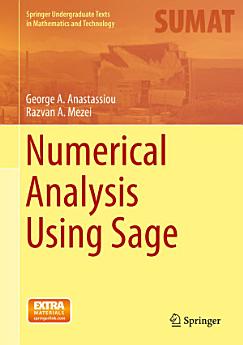Numerical Analysis Using Sage
Información sobre este eBook
The presented code, written in core components of Sage, are backward compatible, i.e., easily applicable to other software systems such as Mathematica®. Sage is open source software and uses Python-like syntax. Previous Python programming experience is not a requirement for the reader, though familiarity withany programming language is a plus. Moreover, the code can be written using any web browser and is therefore useful with Laptops, Tablets, iPhones, Smartphones, etc. All Sage code that is presented in the text is openly available on SpringerLink.com.
Acerca del autor
George Anastassiou is Professor at the University of Memphis. Research interests include Computational analysis, approximation theory, probability, theory of moments. Professor Anastassiou has authored and edited several publications with Springer including "Fractional Differentiation Inequalities" (c) 2009, "Fuzzy Mathematics: Approximation Theory" (c) 2010, "Intelligent Systems: Approximation by Artificial Neural Networks" (c) 2014, "The History of Approximation Theory" (c) 2005, "Modern Differential Geometry in Gauge Theories" (c) 2006, and more.
Razvan Alex Mezei received his PhD from the University of Memphis and currently holds an assistant professorship and Lenoir-Rhyne University, Hickory, North Carolina. He teaches mathematics as well as computer science/IT courses to undergraduates and is a computing sciences program coordinator. Mezei has extensive experience in computer programming and software development and has written several publications with George Anastassiou.






